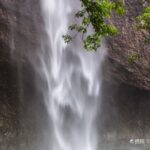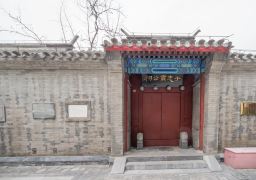Nianbadu is located at the border where Zhejiang, Fujian, and Jiangxi meet, often described by locals as ‘one foot in three provinces’. The Xiangxia Pass to the north and the Fengling Pass to the south enclose Niandudu in an almost isolated environment, yet its culture is surprisingly open and diverse. The more than 3600 residents of the concentrated tourist area of Niandudu town belong to 69 different surnames, which is quite interesting.
The ancient town preserves authentic old buildings, blending architectural styles from the three provinces, with white walls and flying eaves being very distinctive, and the carvings in the details are impressive. Niandudu town includes three villages: Xunli, Huaqiao, and Fengxi. There are many alleys leading into the ancient town, and all the developed attractions that require tickets are along Xunli Street. The most architecturally valuable building is the Wenchang Palace, and other exhibitions mostly utilize the original old houses to display pictures and some physical objects. After the ticketing time, the ancient town can be freely accessed, but paid attractions are not accessible.

Past the scenic area entrance’s Zhupo Bridge is the ticket office. Walking south along Xunli Street, the first point of interest is the Wenchang Palace, which enshrines Wenchang Dijun, Cangjie, and Kuixing, with a very imposing appearance. Here, in addition to admiring the exquisite carvings and structures inside, do not forget to look up at the painted ceiling, which not only features landscapes, plants, but also includes small stories such as ‘Three Visits to the Thatched Cottage’ and ‘Jiang Taigong Fishing’, all very delicate. After visiting, you can write down your wishes on a small card at the wish-granting platform.

Continuing further, in the dialect, surname, and celebrity museum, you can quickly understand the origins and language characteristics of various surnames in Niandudu, which is also a window into local culture. The Dai Li and Female Agent Exhibition Hall was once the place where Dai Li trained female agents. In addition to the layout of each room at that time, there is a short film about his story and life fragments with the female agents. The Guan Yu Temple is the most important node in Niandudu and also the symbol at the south end of Xunli Street. Its surroundings are the bustling part of the entire town, and the nearby stage will have two performances every weekend and holiday, including opera and acrobatics, with a relatively rich program, which you can go to watch.

In addition to the above places, there are several old houses in Xunli for architectural browsing. There is a road from Guan Yu Temple to Fengxi Street, which is not yet developed and does not require tickets, and it is more tranquil and peaceful compared to Xunli. The northern end of Fengxi Street has the Shui Xing Temple, the imposing Dongyue Palace, and the only stone arched corridor bridge, Shui’an Bridge, over Fengxi, all of which are worth visiting.
Niandudu is usually visited together with Jianglang Mountain, Xiangxia Ancient Road, and Fu Gai Mountain, with a one or two-day itinerary. If you plan to stay overnight in Niandudu, there are well-known inns such as Nianba Inn within the scenic area, and there are also many cost-effective hotels on Fengling Street outside the ancient town, with standard room prices around 100 yuan.Two must-eat snacks here are Yan Yuan wonton and Tongluo cake. The former is similar to Fujian-style wonton with swallow skin. Tongluo cake is a snack made of glutinous rice with a flexible texture. If you encounter them, you might as well buy and taste them.
Opening hours: Open all year round from 08:00 to 17:00. Preferential policies: Children: Free for those under 6 years old (inclusive) and under 1.2 meters in height (inclusive). Minors: Enjoy discounted tickets for those aged 6 to 18 years old (inclusive) with valid certificates. Students: Full-time students below undergraduate level can enjoy discounted tickets with valid student ID cards and other valid certificates. Elderly: Free for those aged 70 years old (inclusive) or above with valid identity documents. Enjoy discounted tickets for those aged 60 to 69 years old (inclusive) with valid identity documents. Military personnel: Active-duty soldiers and family members of revolutionary martyrs, soldiers who died on duty, and soldiers who died of illness can enter for free with valid certificates. Disabled people: Free with valid certificates. Journalists: Free with valid certificates. Blood donors in Zhejiang Province: Free with the honorary certificate for blood donation in Zhejiang Province. Model workers and others: Model workers at or above the Quzhou municipal level and special personnel specified by relevant policies can enter for free with relevant valid certificates. Supplementary note: The above information is for reference only. Please refer to the actual situation of the scenic spot on the day. Service facilities: Parking lot: [Nianbadu Parking Lot]. Reference price: ¥10/hour. Address: Inside Nianbadu Ancient Town, Jiangshan City, Quzhou City. Parking spaces: 60. Nursing room: Address: The tourist center provides free services for tourists to feed, take care of babies, and change diapers in the baby care center.








